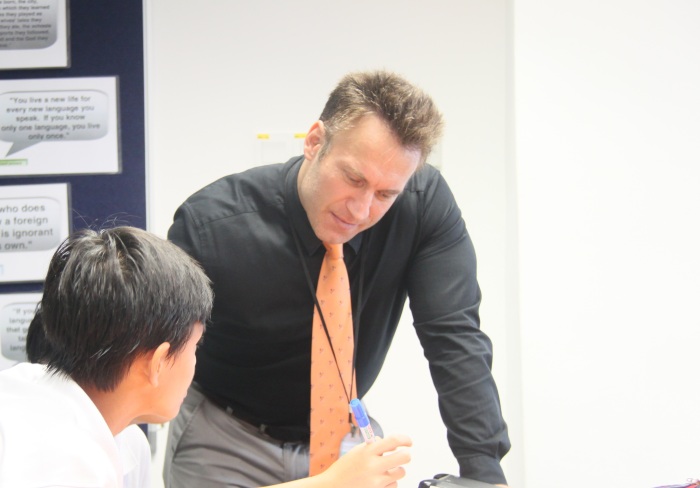
In response to my very controversial blog ‘Six useless things foreign language teachers do’ many of my readers have asked me to point out the ‘good’ things about a language lesson, rather than criticize the ‘bad’ ones.
I am not going to respond by listing the obvious features of a good lesson which scores of educators and researchers have already pointed out and discussed to death. Rather, I am going to focus on 6 things that in my opinion are crucial to the success of an effective language lesson and that in 25 years of teaching and classroom based research I have not seen enough of.
- Systematic recycling of the target material – This is the most obvious element of a good lesson. One sees teachers do it fairly systematically with beginner to pre-intermediate students when dealing with simple vocabulary and grammar (adjectives to describe personality ; daily routine ; jobs ; etc.) ; but when teachers (and textbooks) deal with more advanced vocabulary and more advanced learners (GCSE and beyond) this happens less often. Teachers do stick to the topic-in-hand but do not necessarily recycle the same pool of words/lexical phrases systematically throughout the lessons. Consequently, students’ retention of the target vocabulary is often inadequate. For any lesson purporting to teach new vocabulary to be successful, the lexical content must be planned carefully and each target word/phrase should be recycled five to eight times through a balance of receptive and productive tasks. My website’s concept (www.language-gym.com) is based on this principle.
- ‘Pre-’ is everything – Before involving students in any cognitive and linguistically challenging tasks, teachers must enhance their chances to succeed in and learn from them as much as possible. This entails finding ways to ease the cognitive load the learners are likely to experience during those challenging tasks by ‘prepping’ them. Hence, before engaging them in a challenging reading task or watching a video including a fair number of unfamiliar words, students should be given plenty of opportunities to practise those words through a wide range of activities prior to the reading/viewing. The same applies to challenging speaking tasks involving spontaneous or pseudo-spontaneous speech ; the students should be prepared for them through a series of activities which are highly structured to start with and become increasingly less controlled. Pre-task preparation is crucial in enhancing the learning potential of more challenging and complex activities.
- Regular (structured and spontaneous) learner to learner interaction and minimum teacher talk – A lesson where students interact with each other in the target language is always a pleasure to observe. And if the students have been prepared adequately for the oral task through a range of pre-communicative activities aimed at equipping them with the vocabulary and the structures necessary to cope with it, learning will indeed happen. Oral activities involving ‘filling’ an information gap should feature regularly in MFL lessons – I set myself as a target to have at least a quarter of each lesson of mine devoted to oral interaction involving negotiation of meaning every day – unless the focus of the lesson does not allow it.
- Horizontal before vertical progression – This is related to the concept of recycling developed in point 1, as by horizontal progression I mean the systematic consolidation of the target material, be it grammar structures or vocabulary. My point here is that teachers should not necessarily always aim at progression from a level of challenge to a higher one unless they have evidence – not just a hunch – that the students are actually ready. Often teachers are so eager to achieve by the end of a lesson an ambitious linguistic goal they set for their learners, that they are not prepared to step back and renounce that ‘higher-order goal’ for a ‘lower-order’ one even though several students in the class may still need a lot of consolidation. Language learning occurs along two major dimensions, the acquisition of intellectual knowledge about the target language system (declarative knowledge) and the acquisition of control over performance in the target language under real operating conditions (see my article on cognitive control). Horizontal progression concerns itself with the more important of the two dimensions, proceduralization ; vertical progression, when happening to soon (e.g. in the same lesson) creates declarative knowledge. This is why horizontal progression should always take priority in language learning.
- Extensive receptive practice before production – this is pivotal, as comprehensible reading and listening input provide valuable linguistic modelling ; the target structures and vocabulary should be recycled extensively and systematically in the context of several receptive learning tasks before the students use them productively in speaking and writing. Narrow listening and narrow reading can come in very handy in this respect (see my article on this).
- Preventing the ‘so-what ?’ effect – tactics must be implemented to ensure that every step of the way, in any given lesson, students are aware of what the purpose of every activity staged is – how it is going to enhance their acquisition of the target language, how it is relevant to their life and academic goals, etc. I usually start doing this from the beginning of the lesson, on introducing the new topic / sub-topic , by asking them how they think my learning intentions are going to impact their learning, in their opinion.

Reblogged this on The Language Gym.
LikeLike
[…] have been reading tons of articles! It is fabulous and research based! Two of my favorites are Six things I do in every FL lesson I teach and this one on micro listening […]
LikeLiked by 1 person
[…] Six things I do in every foreign language lesson I teach. […]
LikeLike
Thanks for a great followup to your other “six things” article!
I think the last point is especially crucial and yet overlooked. Students need to know why they’re being asked to do something. If they believe that it’s really useful for their lives, they will try harder and get much out of it.
The students I’m teaching at the moment are learning English to prepare for university, so I’m always telling them, “At the university, your professors are going to expect you to be able to… (paraphrase, write a good introduction, give a presentation using PowerPoint, etc.)… so you’d better pay attention!”
LikeLike
In total agreement! Thanks for dropping by !
LikeLike
I agree! I also think that students are more likely to be receptive to the teacher, materials and activities if they have an understanding of why they are doing what they are doing! Especially in an EAP classroom, as Kristian mentions, this is pretty straightforward. It would be interesting to hear from Gianfranco how asking pupils works, especially as I can imagine there are a few reluctant souls in MFL classrooms who are only there to fulfill the requirements because they have to learn a language? How can we motivate them then to see the value for their own lives?
LikeLiked by 1 person
I just have a single question. I basically apply most of what I’ve read of things to do or not to do in my classroom simply because experience has lead me to basically the same conclusions and my pupils are most of them doing well. Though I teach in a rural area, 2 foreign languages are compulsory in the syllabus starting from year 7 and quite a lot among them do not see the point in learning foreign languages they think they will never need so you constantly have to make it look like a simple game with no effort indeed. That’s ok, I’m used to deal with it, but sometimes it’s incredibly frustrating. As a kid I was so eager to learn foreign languages because I had the feeling it was actually setting me free and opening on unexpected opportunities and…. they… don’t. Maybe I’m being somewhat too passionate but I hate being considered useless and though I’m never short of another idea to motivate them, I would really like to know what you do or would do in a situation like this.
LikeLiked by 1 person
I have been there many times when I was working in inner city areas in England. My advice: 1. Get them to really like you; 2. Get them to experience success in every lesson; 3. Get them to enjoy the lessons whilst learning; 4. Get them to want to visit the country whose language you are teaching and embrace its culture. Easier said and done. A lot of work! Thanks for dropping by.
LikeLike